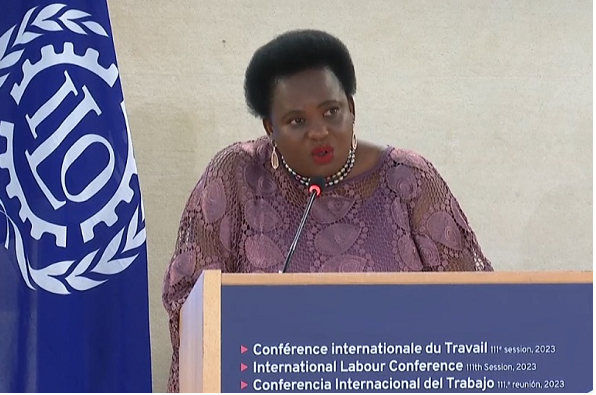![]()
HON BETTY AMONGI ADVOCATES FOR SOCIAL PROTECTION

Geneva, 12th June 2023
Honourable Betty Ongom AMONGI, Minister of Gender, Labour and Social Development, led Uganda’s delegation to the 111th International Labour Conference of the International Labour Organization (ILO) taking place from 5th to 16th June 2023 in Geneva, Switzerland.
Speaking at the Conference, Hon. Amongi emphasized the urgent need for robust public action to address social inequalities exacerbated by the COVID-19, pandemic. She highlighted that pre-existing vulnerabilities and income inequalities, worsened by the pandemic have disproportionately affected women, girls, and workers in the informal economy. Amongi stressed the importance of strong international cooperation and solidarity for an equitable economic recovery.
Hon. Amongi expressed concern that the world is off track in eradicating extreme poverty and achieving global social justice. By 2030, 600 million people, or 7% of the global population, could be living in extreme poverty. She called for renewed commitment to social policies protecting vulnerable groups and emphasized the importance of universal access to social protection for economic and food security, especially during crises.
Hon. Amongi informed the conference that Uganda has implemented several initiatives to support vulnerable individuals and promote social inclusion. These include cash support programs like the Social Assistance Grant for Empowerment (SAGE) for older persons aged 80 years and above, as well as special grants for older persons (65years to 79 years), persons with disabilities, and the Women & Youth Livelihood Funds. To drive post-pandemic recovery, Uganda introduced the Parish Development Model, providing rural cooperative banks with up to USD 500 million per year for agricultural investments to transition 39% of the impoverished population into the money economy. The country also prioritizes institutional interventions for development, focusing on efficiency, inclusivity, resilience, and sustainability. Investing in agriculture, particularly family farming and small-scale food production, is seen as crucial for poverty reduction and addressing social inequality.

